
John Francis Junkin was an English actor and scriptwriter who had a long career in radio, television and film, specialising in comedy.

ABC Television Limited, popularly known as ABC Weekend TV, was a British broadcaster which provided the weekend service in the Midlands and Northern England regions of the Independent Television (ITV) network from 1956 to 1968. It was one of the "Big Four" companies that between them produced the majority of ITV networked programmes during this period.

ITV Central, previously known as Central Independent Television, Carlton Central, ITV1 for Central England and commonly referred to as simply Central, is the Independent Television franchisee for the Midlands. It was created following the restructuring of ATV and began broadcasting on 1 January 1982. The service is owned and operated by ITV plc under the licensee of ITV Broadcasting Limited. Historically Central made a major contribution to the ITV network schedule – especially in entertainment and drama – but today its main responsibility is the regional news service.

Jeeves and Wooster is a British comedy-drama television series adapted by Clive Exton from P. G. Wodehouse's "Jeeves" stories. It aired on the ITV network from 22 April 1990 to 20 June 1993, with the last series nominated for a British Academy Television Award for Best Drama Series. Set in the UK and the US in an unspecified period between the late 1920s and the 1930s, the series starred Hugh Laurie as Bertie Wooster, an affable young gentleman and member of the idle rich, and Stephen Fry as Jeeves, his highly intelligent and competent valet. Bertie and his friends, who are mainly members of the Drones Club, are extricated from all manner of societal misadventures by the indispensable Jeeves.
The Kenny Everett Video Show is a British television comedy and music programme that was made by Thames Television for ITV from 3 July 1978 to 21 May 1981.
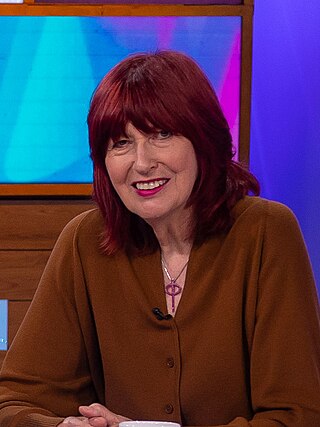
Janet Vera Street-Porter is an English broadcaster, journalist, writer, and media personality. She began her career in 1969 as a fashion writer and columnist at the Daily Mail and was later appointed fashion editor of the Evening Standard in 1971. In 1973, she co-presented a mid-morning radio show with Paul Callan on LBC.

UTV is the ITV region covering Northern Ireland, ITV subsidiary and the former on-air name of the free-to-air public broadcast television channel serving the area. It is run by ITV plc and is responsible for the regional news service and programmes made principally for the area by the UTV production team. It currently uses the network ITV1 channel with an opt-out service for local advertising and on-air promos for local programming.
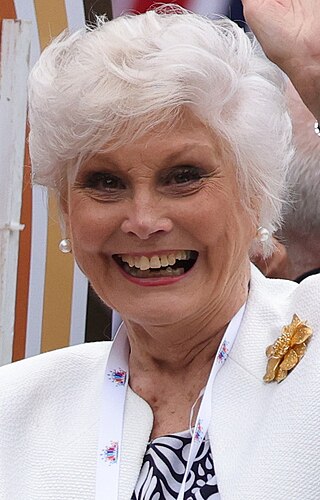
Angela May Rippon is an English broadcaster, former newsreader, writer and journalist.
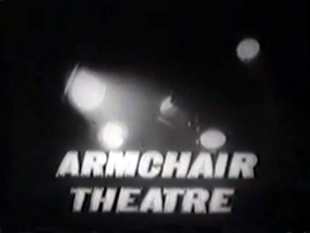
Armchair Theatre is a British television drama anthology series of single plays that ran on the ITV network from 1956 to 1974. It was originally produced by ABC Weekend TV. Its successor Thames Television took over from mid-1968.

The Grove Family is a British television series soap opera, generally regarded as the first of its kind broadcast in the UK, made and broadcast by the BBC Television Service from 1954 to 1957. The series concerned the life of the family of the title, who were named after the BBC's Lime Grove Studios, where the programme was made.
Brian Patrick Robert Dowling is an Irish television and radio presenter. He rose to fame after winning the second series of reality series Big Brother, and went on to win Ultimate Big Brother in 2010. In 2007, he came third in Hell's Kitchen and in 2008, he was runner-up in the Irish reality television series Fáilte Towers. Dowling then guest-presented Live from Studio Five alongside Kate Walsh from 2010 until its cancellation in February 2011.

Eric Richard Porter was an English actor of stage, film and television.
Who Dares Wins is a British television comedy sketch show, an adaptation of BBC Radio 4's Injury Time, broadcast between 1983 and 1988, featuring Jimmy Mulville, Rory McGrath, Philip Pope, Julia Hills and Tony Robinson. It was one of the first TV outlets for alternative comedy and was broadcast by Channel 4 late at night in a first attempt at "Post-Pub television". It was eventually aired by the Playboy Channel in cable television outlets in the United States.

DEF II was a programming strand on BBC2, which aired at 6 pm on Mondays and Wednesdays from 9 May 1988 to 23 May 1994, to serve the teenage market. It was produced by Janet Street-Porter, and followed on from her influential youth TV show Network 7 on Channel 4.
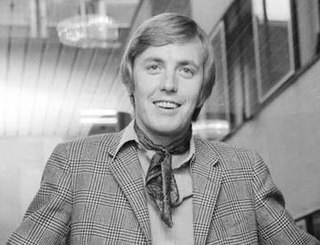
Cyril Nicholas Henty-Dodd, better known by his stage name Simon Dee, was a British television interviewer and radio disc jockey who hosted a twice-weekly BBC TV chat show, Dee Time, in the late 1960s. After moving to London Weekend Television (LWT) in 1970, he was dropped and his career never recovered.
Broken News is a comedy programme shown on BBC Two in late 2005. The show poked fun at the world of 24-hour rolling news channels. The title of the show is a play on the phrase "breaking news". It had six thirty-minute episodes. Having previously worked on programmes such as People Like Us and The Sunday Format, the show's production team worked closely with writer and director John Morton.

Jenny Hanley is an English actress and presenter. She was one of the presenters of the ITV children's magazine programme Magpie. She currently presents a show on Boom Radio.
Motormouth was a Saturday morning children's entertainment series that was produced by TVS and broadcast across the ITV network for four series, running between 3 September 1988 and 4 April 1992. Each series generally ran from the autumn of one year to the spring of the next, as was common among many 'main' Saturday morning series.
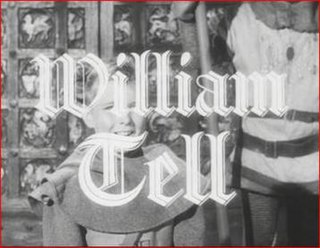
The Adventures of William Tell is a British swashbuckler adventure series, first broadcast on the ITV network in 1958, and produced by ITC Entertainment. In the United States, the episodes aired on the syndicated NTA Film Network in 1958–1959.
This is a list of British television related events from 1962.














